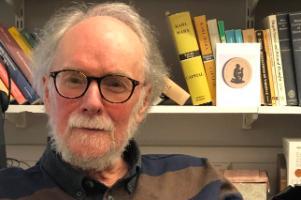Andrew Linklater (1949-2023)

Andrew Linklater, the 10th holder of the historic Woodrow Wilson Chair in International Politics at Aberystwyth University, died in Bronglais Hospital on 5 March 2023. He had been diagnosed in 2017 with Idiopathic Pulmonary Fibrosis - an unremitting disease which he endured stoically. Professor Linklater was a world-renowned theorist of international relations.
Andrew was born on 3 August 1949 in Aberdeen. He went to the local university and studied Politics and International Relations and was awarded an MA in 1971. He then moved to Balliol College, Oxford, where he gained a BPhil in 1973. In 1978 he completed his doctorate at LSE - he and his wife Jane having already left the UK in 1976 for Andrew to take up a position in Hobart, Tasmania. They stayed until 1981 when they moved to Melbourne, when Andrew was offered a post at Monash University. In 1993 they returned to the UK, and Andrew became Professor of International Relations at Keele University. In 1999 he was appointed to the Woodrow Wilson Chair at Aberystwyth University. The vibrant research culture of Aber’s ‘InterPol’ Department - postgraduates as well as staff - converged with Andrew's own commitment to engage with the biggest problems of human society in the turbulent arena of global politics. He then spent nearly half his academic career in the Department. In 2005 his reputation internationally was marked by his election to the Fellowship of the British Academy (FBA).
Professor Linklater’s first single-authored book was Men and Citizens in the Theory of International Relations (1982). Based on his PhD, this is still considered a key work in the ‘critical turn’ in IR theory. It provided the foundation for a reconsideration of the discipline’s traditional focus on inter-state power politics towards the study of the development of political communities. In particular, he explored the tension between obligations to fellow members of a community and ‘cosmopolitan’ obligations towards humanity as a whole. The book contained an innovative synthesis of IR theory with the thought of such giants of philosophy, political theory, and sociology, as Immanuel Kant, Karl Marx, Friedrich Hegel, and Jürgen Habermas. The puzzle identified in Men and Citizens remained at the heart of Andrew’s life-long research.
Two other notable works followed: Beyond Realism and Marxism: Critical Theory and International Relations (1990) and The Transformation of Political Community: Ethical Foundations of the Post-Westphalian Era (1998). The latter outlined a ‘critical international theory’ which opened the way for an understanding of how modern states might be transformed into more inclusive forms of political community. It established the agenda for numerous studies of the cosmopolitan dimension and potential in world politics.
During his time in Aberystwyth, Andrew’s research underwent a ‘sociological turn’, becoming deeply influenced by Process Sociology and particularly the work of Norbert Elias (1897-1990). His theoretical concerns into the relations between insiders and outsiders of political communities deepened, notably through an investigation of ‘harm conventions’. He was particularly interested in exploring the possible emergence of what he called ‘cosmopolitan harm conventions’, namely those which protected all human beings from certain forms of harm irrespective of their nationality, race, class, or gender. Through his engagement with Elias’s work on ‘civilizing processes’ in particular, Andrew developed an innovative sociological approach to the study of the role of harm conventions in international politics in a long-term historical perspective. This research led to: The Problem of Harm in World Politics: Theoretical Investigations (2011), Violence and Civilization in the Western States-Systems (2016), and The Idea of Civilization and the Making of the Global Order (2020).
In his final days Andrew was working on a book on 'symbols', a volume he considered to be the last in his series of process sociological works. Across the broadest panorama, he was exploring the potential for the development of cosmopolitan symbols promoting identification not only with the entire human species, but also beyond, namely non-human species and ecosystems. The closing sections of the book discuss the emergence of symbols connected with the contemporary global ecological crisis, and the potential for the radical expansion of the frontiers of human emotional and moral identification. The book will be completed by his former PhD student, André Saramago.
Beyond his single-authored books, Andrew produced a collection of influential articles and other publications. Special reference should be made to The English School of International Relations: A Contemporary Reassessment (2006), co-authored with Hidemi Suganami, and Theories of International Relations (1996), co-edited with Scott Burchill.
Former students remember Andrew as a truly inspiring teacher. Moreover, he was not only wise but looked it. Over the decades, with his longish greying hair, gentle Aberdonian brogue, and wonderful sense of humour, he drew his listeners into sharing his reflections on the world. Those PhD students lucky enough to have him as their supervisor believed they had won the academic equivalent of the Lottery Jackpot.
As a colleague Andrew was genial, cooperative, and an always trusted adviser. Younger members of staff often described him as a ‘mentor’ rather than simply ‘colleague’, and the word ‘conversation’ has featured prominently among those remembering Andrew in recent days. Whether a conversation was brief or long, friends have recalled Andrew’s readiness to engage. His breadth of enthusiasms was legendary: horses (bloodstock breeding, racing, paintings), pottery (especially Josiah Wedgwood), art (notably Aboriginal paintings), music (jazz and classical guitar), snooker and football, and fine old cars and even finer malt whisky. He had a lifelong love of nature, and this surely led him to be one of the earliest in the discipline to stress the need for IR specialists to engage with global environmental issues.
Andrew’s reputation as a giant among IR scholars is secure, resting as it does on his prolific, panoramic, and profound written work. But for those who had the pleasure and privilege of knowing ‘Andy’ personally, his books and articles tell only part of his story.
Ken Booth, Martin Alexander, André Saramago
Photo credit to Dr Jenny Matters
